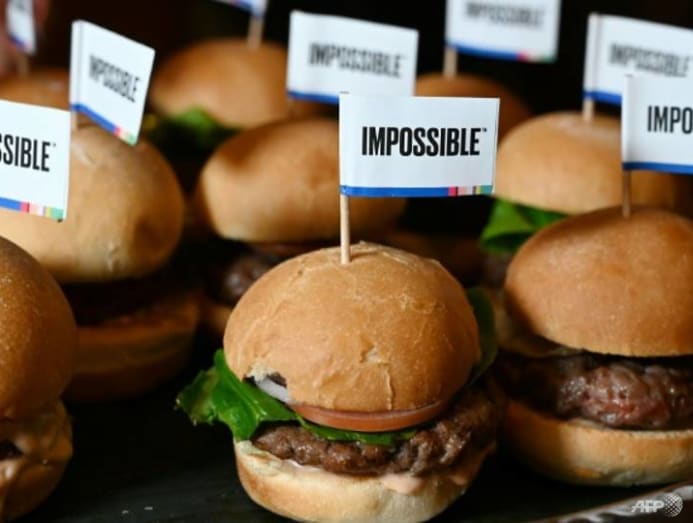No red meat, more veggies? How to know if a plant-based diet is right for you
How is it different from being vegetarian? Will it really improve your health and fitness? CNA Lifestyle talked to health experts to find out if you should go on one.

(Photo: Unsplash/Mike Von)
You’ve probably come across stories of people proclaiming how going on a plant-based diet has changed their lives for the better.
These could even be first-hand accounts from a friend or a relative you previously knew as a hardcore carnivore who scouted the island for the best steak and char siew – and is now embracing kale salads and asking for extra veggies like a new mantra.
But have you ever wondered why someone would resolutely make that 180-degree lifestyle change?
There are different reasons why many people are adopting plant-based or vegan diets in Singapore, said Professor Francis Seow-Choen, a consultant colorectal surgeon from Concord International Hospital.
These could range from “influence by the media and advertising, the belief that it contributes to saving the world, animal rights and activism, and better health.”
READ: Cooking tips: How to make canned food and instant noodles more nutritious
The latter is something that seems to be catching on here, according to Jaclyn Reutens, a dietitian and founder of Aptima Nutrition and Sports Consultants.
Recent health scares – like being diagnosed with prediabetes or having borderline high blood pressure and cholesterol readings – have a tendency to spur some to make an effort to eat healthier.
In fact, since the middle of 2019, Reutens revealed she’s received 10 per cent more queries on plant-based diets and how to get started on it. “Some are trying it for general health purposes to just feel better; some for weight loss, or to manage or prevent diabetes,” she said.
HOW IS A PLANT-BASED DIET DIFFERENT FROM VEGETARIANISM?
While vegetables are certainly involved, there are differences between a plant-based diet and vegetarianism.
“A plant-based diet encourages a greater intake of fruit, vegetables, legumes and nuts, but does not strictly exclude animal-based products such as meat, fish, poultry, eggs and dairy,” said dietitian Goh Qiu Le from Changi General Hospital’s Dietetic & Food Services.
As for vegetarianism, it comes in many forms, continued Goh. “Lacto-vegetarian diets exclude meat, fish, poultry and eggs, but include dairy products such as milk, cheese and yogurt. Ovo-vegetarian diets allow eggs, while avoiding meat, fish, poultry and dairy products. Vegan diets exclude meat, fish, poultry, eggs and dairy products.”
But no matter what form of vegetarianism, the main difference between a vegetarian and someone who is on a plant-based diet is processed foods, said Reutens.
A plant-based diet “steers you to consume more minimally-processed products instead of highly-processed foods that contain refined sugars”.

WHEN DO YOU START GOING ON A PLANT-BASED DIET?
The good news is, “it is never too late to improve our dietary habits”, said Goh. “Studies have shown that plant-based diets are associated with reduced risks of chronic diseases, such as heart disease and Type 2 diabetes.”
Reutens shared the same sentiments: “If you have developed high cholesterol or high blood pressure in your 40s because of bad lifestyle habits, it is not too late to manage these conditions through a change in your diet such as a plant-based diet”.
READ: Working from home? How to stop gaining weight from all that snacking
As for sticking to it, Goh advised to make the changes gradual. “Sudden, abrupt changes, while well-intentioned, may not be sustainable in the long run. Instituting gradual, positive changes has been shown to be more achievable for most people,” he said.
To set you on the right path, “seek professional advice and confirmation from a dietitian” first, said Goh, before making changes to your eating habits and lifestyle.
CAN GOING PLANT-BASED HELP TO BOOST FITNESS?
Some fitness-conscious individuals could be inspired to switch after watching documentaries such as Netflix’s The Game Changers, which showcased how elite athletes and special ops soldiers got bigger, faster and stronger by going vegetarian.
“Many people are shocked by such documentaries but it is important to know that they are often not as evidence-based and objective as they appear,” said Prof Seow. “They may make broad generalisations to suit their storylines. It is highly advisable to use hard science-based evidence to guide our diet decisions.”
Prof Seow wouldn’t recommend switching to plant-based to up your fitness game. Also, individuals who are sick, recovering from a major surgery or going through puberty “will benefit much more from meat-based than plant-based diets”, he said.
Reutens is also unconvinced by such documentaries. “(The Game Changers) incorrectly led people to believe that not just plant-based but a vegan diet trumped one that included animal protein. There are so many nutritional challenges in a vegan diet but those were clearly omitted.

“The makers of the documentary are vegan, so I would take the nutritional stance of the show with a pinch of salt because it was clearly from a biased perspective. There are so many successful medal-winning athletes who are not vegan or even close to following a plant-based diet,” said Reutens.
So if you’re thinking of going plant-based in the hopes of boosting your performance like ex-UFC fighter James Wilks, maybe you should reconsider. “Watch it for the entertainment value and not live your life by it. You are not going to be jumping out of planes like Tom Cruise after watching Mission Impossible, are you?” said Reutens.
WHAT ARE THE OTHER EFFECTS OF A PLANT-BASED DIET?
As friends and colleagues who are plant-based converts would effusively tell you, they feel better than the meat-gnawing population.
And they might be right. “If their previous diet was one that was very high in red meat, one of the immediate effects would be that they feel great because they would have ingested a lot less fat that made them sluggish,” said Reutens.
“The initial effects would be a surge in energy levels, better bowel movements, and they would be more conscious of their food intake,” she said, adding that in the long run, a plant-based diet can reward you with “good energy levels, a healthier digestive tract, mentally more alert, and a significant reduction of health risks associated with a high intake of animal products”.
But is a plant-based diet for everyone? It is, after all, about eating more greens and that can’t be bad, right? “It may not suit everyone because some individuals may need a high iron intake and red meat is a very good source of iron,” said Reutens.
Prof Seow also recommended taking a plant-based diet’s “deemed merits with care”. “Humans need essential fatty acids and essential amino acids that are readily obtained from animal sources but are lacking or rare in plant sources,” he said.
READ: How to manage coronavirus-related stress eating (or not eating)
Other nutrients that may be deficient include calcium, iron and Vitamin B12, said Reutens. In fact, a plant-based diet may pack too much carbohydrates and fats, especially saturated fats, she said, and you may end up feeling tired (from the lack of iron) as well as body aches and cramps (from the lack of essential minerals) eventually.
Prof Seow is also concerned about the higher intake of fibre. While fibre has been associated with better bowel movements, he said that too much fibre can create more problems. “Undigested fibre ferments in the large intestine and results in bloating, gas, cramps, irregular bowel with small, pellet-y stools, bulky stools, diarrhoea or irritable bowel syndrome (diarrhoea alternating with constipation).
“We are seeing an increasing number of people admitted to hospitals with irritable bowel syndrome, constipation, abdominal pain and/or diarrhoea because of the increased ingestion of plant products,” he said.
WHAT ABOUT FAUX MEAT? IS IT HEALTHIER THAN REAL MEAT?
You would have heard of or even tasted products such as Impossible Burger, Beyond Sausage and Quorn Sausage Patties. And while they are purportedly better for the environment, are they actually better for you?
“Plant-based meat substitutes are higher in sodium due to the processing methods, and a high sodium intake is associated with greater risks of cardiovascular disease,” said Goh.
READ: Having more sweet drinks while stuck at home? It might lead to dehydration
In fact, Reutens doesn’t think such products qualify as plant-based. “Faux meat is considered a highly processed food, and I do not see it as nutritionally superior to its real meat counterparts.” If you want to switch to plant-based protein, she said you’re better off dipping into beans, peas, lentils, chickpeas, nuts, seeds, quinoa that can provide good amounts of proteins, minerals and energy.
“Since a plant-based diet allows you to eat real meat, you should eat it. The leaner cuts of red meat are more nutritious than faux meat. But if you want faux meat to be one of your tastier vegetarian options, there is no harm in including it from time to time,” said Reutens.

WOULD THE EXPERTS RECOMMEND GOING PLANT-BASED?
As beneficial as a plant-based diet is to health, Goh said that “it is not the only way to achieve positive health outcomes”. “Each patient has a unique set of conditions and there is no single diet that is all encompassing.”
Furthermore, “healthy eating is neither complicated nor expensive – eat two servings of fruit and vegetables daily, stay adequately hydrated, and choose leaner sources of protein at meals”, said Goh.
READ: 6 powerful foods that can help you eat your way to a stronger immune system
Reutens agreed that the plant-based diet is not the singular path to a healthier life and wouldn’t “routinely recommend” it – unless the patient has been “consuming too much meat and poultry and is negatively affecting their health”. “I do tell my patients to eat less red meat but not to the extent of a plant-based diet unless they pursue the topic further.”
“There is currently no medical reason to go on plant-based diets,” said Prof Seow, adding that people who do are usually advised to by their doctors for “different kinds of intestinal problems” caused by diabetes, hypertension or cancer.
“Even young people who switch to too much plant-based foods develop malnutrition and other symptoms when they change to plant-based diets. I would usually advise them against a vegan diet to ameliorate these problems,” said Prof Seow.





